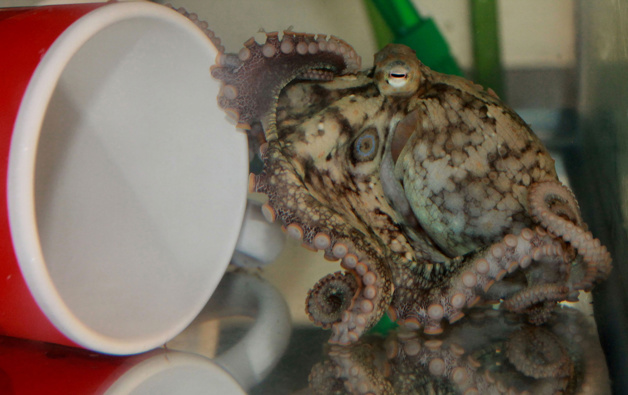Follow
the podcast on

"A lot of people say an octopus is like an alien," says filmmaker Craig Foster in his new Netflix documentary "My Octopus Teacher."
"But the strange thing is, as you get closer to them you realize that you're very similar in a lot of ways."
One of those ways the octopuses are both familiar and foreign is that when they wrap their long arms around prey or another object, they are both touching it (familiar) and tasting it (not so familiar).
Scientists are now seeing how octopuses use their "touch-taste" sense, activating sensory receptors on their suckers dotting the length of their eight arms, according to a new study published in the journal Cell.
The study provides new insight into how the creatures use their long flexible tentacles to interpret both danger and delight in the waters around them.
"They're always exploring their environment. They're just a big muscle practically," said Nick Bellono, an assistant professor of molecular and cellular biology at Harvard University, and the study's lead author.
The research followed on earlier scientific work on octopuses, in which other researchers had observed their suck cells under a microscope and seen sensory cells comparable to those found in the nose or on the tongue of a terrestrial mammal. The taste-by-touch ability could have evolved in octopuses to suit a range of possible activities.
"Maybe it's using taste by touch for exploration," Bellono said.
Octopus suckers have tasting cells
To find out how octopuses taste their food and their surroundings, the team studied two female California two-spot octopuses, which had been caught in the wild. In their lab, they kept the creatures in separate tanks (since octopuses are solitary animals), supporting them on a daily diet of fiddler crabs.
That species averages about 18 inches in length and live in the Pacific Ocean along the coast of northern California southward to Mexico, according to California Sea Grant, a collaboration of the National Oceanic and Atmospheric Administration, the State of California and universities. The two-spot octopus eats smaller crustaceans and mollusks and its natural predators are sea lions, harbor seals, moray eels and humans.
Bellono and his team determined that these octopuses' suckers possessed sensory cells. When housed in the sea water tank, the octopuses would extend their tentacles to grab objects through a hole in the tank wall. When they found prey, such as a fiddler crab, they wrapped their arms around it and brought it in closer.
If they grasped an inanimate object, they let go of it and continued searching their environs with sweeping motions of their arms.
The researchers extracted and isolated groups of their sucker cells, without hurting the animals, to see the behavior of proteins the cells produced. They performed experiments to see how the proteins from the chemoreceptor cell reacted to extracts of cells from octopus prey.
"They responded in a very stereotypic manner," Bellono said. "Those proteins respond to those stimuli in the same way as a sensory cell."
Tasting in the sea
It's known that particles easily travel through the air before they might be sniffed into a bear or a wolf's nostrils. However, the process of smelling or tasting is much less clear in cephalopods --a group of mollusks that includes octopuses, squids and cuttlefish -- living in the ocean. That's especially true when particles emitting a scent are not very soluble in water, Bellono said.
While people tend to perceive five basic tastes -- sweet, bitter, sour, salty and umami (meaty) -- octopuses experience the world of taste differently.
Instead, they found the most success in stimulating octopuses to respond to what are called terpenoid molecules, commonly secreted by marine invertebrates, as a defense or warning signal. They smell these molecules, and in a way, they can smell fear in their prey.
These sensations could also be a way of warning the octopus whether something it's tasting could be toxic, the reseachers said.
Terpenoid molecules are not very water soluble, so octopuses can't sit and wait for smells and tastes to wash or flow over to them. That's why they essentially need to directly grasp the given object in order to get a taste.
It's also likely that octopuses can touch-taste other a variety of stimuli beyond terpenoid molecules, Bellono said
But the octopuses' chemical receptors did not respond to most odorants or tastants, as humans might. The researchers did get a reaction from one compound, chloroquine, that tastes bitter to human.
One follow-up study that the team would like to pursue would involve looking at molecules excreted by predators to octopuses. Or it could be worth looking into squids to see if their two arms used for grabbing prey also have a similar ability to taste.
Bellono, whose lab is broadly interested in researching how organisms adapt to their environment, explained that the research built on the team's recent work into the basic physiology of sea creatures.
Those inquiries have included exploring why jellyfish chose to sting their prey or not, and how photosynthetic sea slugs produce energy.
"We explore basic science because we never know what we'll find or why it will be useful," he said. "I would hope this study is just a good example of exploring your curiosity and seeing what you find."
text by Ryan Prior, CNN
Take your Radio, Podcasts and Music with you









